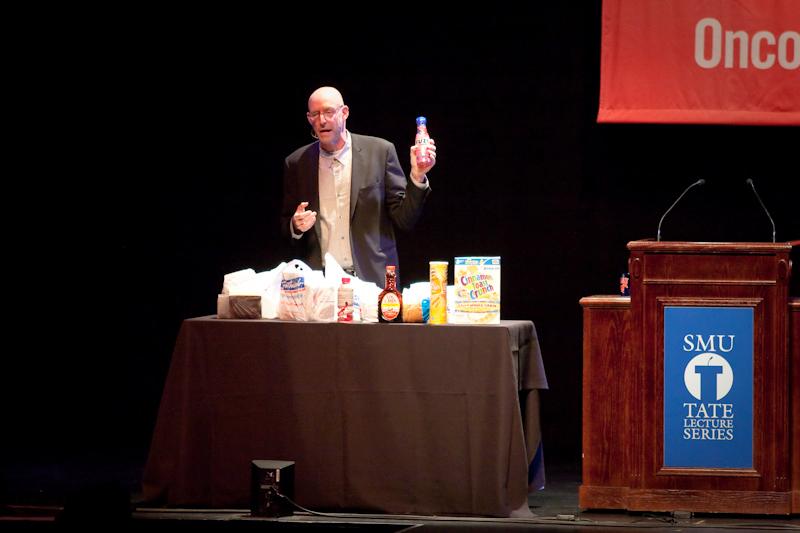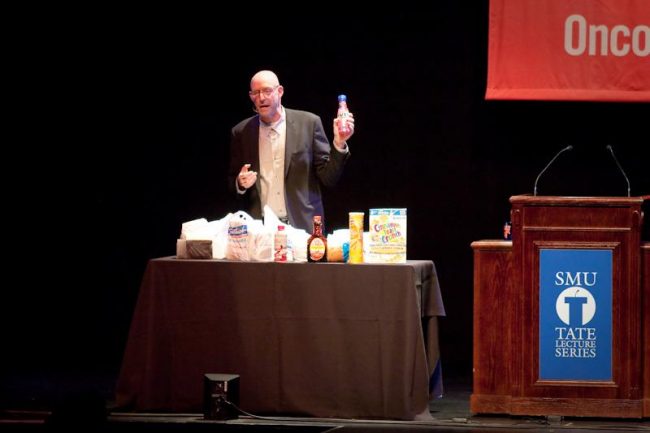
Micheal Pollan athor of “Food Inc.” spoke to SMU in part of the Tate Lecture series Thursday night. (Spencer J Eggers/The Daily Campus)
Bestselling author Michael Pollan brought grocery bags onto the stage at the Tate Lecture Series Thursday.
The healthy food activist showed a shocked audience the truth behind many family favorites.
“A cereal full of sugar is being sold as medicine for parents and as candy for children,” Pollan said. “The food industry is always a step ahead of us.”
Pollan criticized many of the manipulative tricks of processed food companies.
“Whole grain is the number one ingredient in a box of Cinnamon Toast Crunch but the next four ingredients are different types of sugar,” Pollan said.
The Oxford educated journalist contends that after World War II, America experienced a food revolution that brought more processed and refined foods to the marketplace.
“There were many changes in the American system and the real change took place in 1977 with the government-mandated low fat campaign,” Pollan said.
In 1977, the government believed that a dramatic rise in national rates of heart disease were largely due to animal fat.
When establishing policy, legislators followed dangerous precedents that would affect food for the next three decades.
“Food legislation went from being written in clear to obscure language. But, the biggest problem is that we have gone from talking about familiar food to talking about nutrients,” Pollan said. “And that’s the real issue. We’ve reduced all food thought into a narrow framework.”
Nutritionism — a term coined by critiques of the current food system — has shaped how the American media, public and experts perceive consumption.
The concept is based around four main tenets: the key to understanding any food is based around the nutrient, experts are critical to food advice, a binary between blessed and evil nutrients exist and the only purpose of eating is health.
“We need a priesthood of experts to tell us about nutrients and what to eat. Food was once a very simple activity and now it has become very complex,” Pollan said.
Pollan warned that nutritional science is still a relatively new field and lacks credibility in comparison to other sciences.
“Nutrition science is where surgery was in 1650. We have to be humble in how we pick our foods,” Pollan said.
Pollan recommended a return to tradition in order to preserve American health.
He stressed that three basic facts about food can lead to a consumption revolution.
“We know that a Western diet full of processed foods and a lack of vegetables leads to high rates of chronic disease. We also know that pre-Western diets lead to low rates of disease,” Pollan said. “But the key is knowing that a switch in diets from Western to pre-Western can lead to healthy changes.”
For Pollan, food efficacy is based around simplicity and family culture.
His new book “Food Rules: An Eater’s Manual” gives readers simple advice on maintaining healthy eating habits.
Most of Pollan’s advice originated from a wide demographic of America — grandmothers, cardiologists and teachers.
“My philosophy is based around seven simple words that say eat food not too much mostly plants,” Pollan said.
The book includes short adages to remind eaters about what is healthy.
“The whiter the bread, the sooner you’ll be dead. Don’t buy any food that you see advertised on television. Don’t buy any cereals that change the color of milk,” Pollan said.
Pollan believes conventional wisdom can turn back the American paradox — an obsession about health and food and yet one of the worst rates of avoidable diseases in the world.
“Food should be about pleasure, communal eating and identity,” Pollan said. “It a vexing food landscape that we face but we can make the right choices.”









